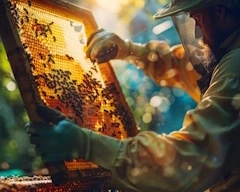Ess Pee\'s, established in 2007 by trained beekeeper Mr. SP Singh, has carved a niche for itself in the private-label market. With a focus on "Premium Quality" and 100% exports, the company boasts a diverse product portfolio including Bees Honey, Nutri Break cookies, Black/Green Tea, and in-house label manufacturing. This article explores Ess Pee\'s commitment to building a sustainable supply chain, ensuring quality while minimizing environmental impact.
Sourcing for Sustainability
Ess Pee\'s commitment to ethical sourcing starts with its honey. The company maintains its own bee farms/apiaries, promoting beekeeping practices that benefit pollination and ecosystem health. Additionally, they source honey from select regions like the Himalayas, Uttarakhand, and Punjab, known for their pristine natural environments. For specific honey varieties like Orange Blossom (popular in the USA), Ess Pee\'s partners with responsible beekeepers who share their sustainability goals.
The company extends this philosophy to their cookies. They offer options like gluten-free, sugar-free, and multigrain cookies, catering to diverse dietary needs. Sourcing high-quality ingredients that are produced with sustainable practices remains a key focus.
Transparency Throughout the Chain
Ess Pee\'s demonstrates transparency at every step of the supply chain. Certifications like Kosher, HACCP, HALAL, ISO22000, ISO9001, SASO, FSMS, USFDA, GMP (applied), and BRC speak volumes about their commitment to food safety and hygiene. This transparency builds trust with both suppliers and customers.
Minimizing Environmental Impact
Ess Pee\'s understands the importance of minimizing its environmental footprint. Here are some ways they achieve this:
- Local Sourcing: By sourcing honey from geographically close regions and focusing on in-house production, Ess Pee\'s reduces transportation emissions.
- Sustainable Packaging: Exploring eco-friendly packaging options like recycled cardboard or biodegradable materials can be a step forward.
- Renewable Energy: Investigating the use of solar power or other renewable energy sources in their manufacturing units can significantly reduce their carbon footprint.
- Waste Reduction: Implementing efficient production processes and minimizing waste generation throughout the supply chain is key.
Collaborations for a Greener Future
Ess Pee\'s can further strengthen its sustainability efforts through collaborations. Partnering with:
- Sustainable Agriculture Organizations: Collaboration with organizations promoting sustainable beekeeping and agricultural practices can provide valuable insights and resources.
- Recycling Initiatives: Partnering with local recycling programs can ensure responsible disposal of packaging materials.
- Environmental NGOs: Working with NGOs on environmental education and conservation projects can create a positive impact beyond the supply chain.
The Road Ahead
By continuously improving its sourcing practices, exploring sustainable packaging solutions, and collaborating with like-minded organizations, Ess Pee\'s can solidify its position as a leader in the private-label market, not just for premium quality, but also for its commitment to environmental responsibility. Consumers are increasingly seeking brands that align with their values, and building a sustainable supply chain offers Ess Pee\'s a competitive edge while contributing to a healthier planet.
This article has provided a glimpse into Ess Pee\'s journey towards a sustainable future. While the information provided outlines existing practices, there is always room for improvement. By continuously evaluating and adapting its strategies, Ess Pee\'s can remain at the forefront of sustainable business practices within the private-label industry.


